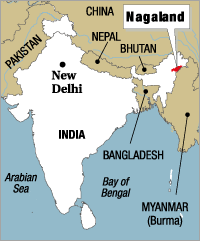
Pattersons celebrate 100 years of Baptist work in Nagaland
by Gregory Tomlin
FORT WORTH , Texas (BP) – They were once warriors who settled disputes with headhunting. The Naga people are now a nation of Baptists, thanks to the endeavors of American Baptist missionaries a century ago.
Baptists in Nagaland , India , celebrated the centennial anniversary of the Baptist faith in their country Dec. 3-7. Today, fully 80 percent of the nation's 2 million Nagas are Christians.
Celebrating with them were Paige Patterson, president of Southwestern Baptist Theological Seminary in Fort Worth , Texas , and his wife, Dorothy. The couple brought greetings from Southern Baptists in the United States .
Patterson preached before a gathering of 12,000 Sumi tribesmen in Zunheboto in central Nagaland and to more than 8,000 additional Sumis congregated in Dimapur in western Nagaland. A third group from the Sumi tribe, numbering almost 5,000, gathered at a third location.
Rev. Hevukhu Achumi, director of missionary work among the Naga people explained that “there were simply too many Naga Baptists to have all the Naga Baptists meeting together.”
Several hundred tribesmen made professions of faith in Christ as Patterson extended invitations.
Mrs. Patterson presented her testimony at the gatherings. She encouraged Naga women to study Scripture, reach other women and give themselves faithfully to the highest calling of being a wife and mother.
Patterson praised the Nagas for their incredible growth but challenged them to avoid becoming too comfortable in their obvious success.
“This Baptist island, this evangelical paradise is surrounded by strong Hindu, Buddhist and even Islamic forces. What a marvelous opportunity God has given the Naga people,” Patterson said. He also said that he was delighted in the presence of about 10 Naga students at Southwestern Seminary.
Two of those students received doctoral degrees during the seminary's 206th commencement ceremony Dec. 12. Both students plan to return to Nagaland to teach and work among the Baptists there.
Mrs. Patterson confessed amazement at the large gatherings of Baptists. “They never failed in any assembly to express gratitude for the American Baptist missionaries who brought the message of Christ to them 100 years earlier,” she said. She also said she was astounded at “the general happiness of these oppressed people” and that she was “overcome by their love and hospitality.”
Located in far East India with Myanmar to the south, the mountainous terrain and dense jungle of the province make Nagaland one of the most inaccessible locations on the face of the globe. The only airport in the province is located in Dimapur.
Winding, pot-marked narrow roads -- often no more than mud trails -- are the primary means of transportation 250 miles to the east to Mon, the eastern most city.
Nagaland remains remote because of its geographical terrain, but also because the Indian government strictly regulates visits from foreigners. Only in the last seven to eight years has armed Naga resistance to what they consider Indian occupation of the country lessened. The presence of Indian soldiers is always noticeable, Patterson said.
The people are generally poor and long to be free, Patterson said, but “for all of that they are the happiest, most contented people I have seen anywhere.”
“What happened in Nagaland is a high tribute to the American Baptist pioneer
missionaries who created a genuine church planting movement, and in so doing demonstrated that you can have a Baptist church planting movement,” Patterson said.
Source: http://www.swbts.edu/publicrelations/story.cfm?id=41DD8304-E30A-A9FC-7A0BBB4A5DBA01EB
My question: where is the modern zeal for missions among American Baptists? Could we have mustered the effort to reach the Nagas today, torn as we are by doctrinal and ethical controversies? Sadly, I think not. Theological clarity is needed for missional effectiveness.
No comments:
Post a Comment